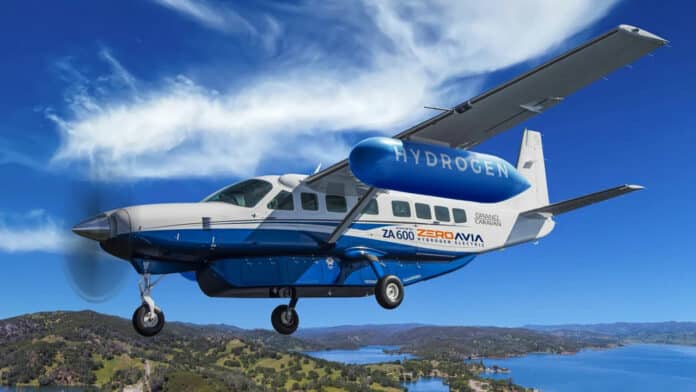Technology start-up ZeroAvia has entered into a non-exclusive Joint Development Agreement with Textron Aviation to develop hydrogen-electric, zero-emission powertrains for Cessna Grand Caravan (208B) aircraft. ZeroAvia will obtain a supplemental type certificate (STC) to retrofit the Grand Caravan single-engine utility turboprop with the 600 kW (850 hp) ZA600 zero-emission powertrain, targeting commercial passenger and freight carriers.
The Cessna Grand Caravan aircraft is designed and manufactured by Textron Aviation. Its high-wing design makes the Caravan a strong candidate for mounting hydrogen fuel tanks under the wings, allowing operators to maintain seat capacity or cargo space while transitioning to true zero-emission propulsion systems.
ZeroAvia will develop its ZA600 powertrain system for the Grand Caravan with support for data, engineering, and certification from Textron Aviation. The company aims to obtain certification for the 600 kW powertrain as early as 2025, enabling customers to operate zero-emission flights.
“The famous Cessna Grand Caravan is on track to be one of the first airframes operating commercial services – both cargo and passenger – with hydrogen-electric, zero-emission engines,” said Val Miftakhov, Founder and CEO of ZeroAvia. “We applaud the visionary leadership of Textron Aviation in joining us to help transform a much-loved mainstay of sub-regional aviation into a symbol of a sustainable transformation in aviation.”
ZeroAvia is already well advanced in retrofitting its system into a 19-seat Dornier 228 aircraft, with the first test flights anticipated over the next few weeks.
Its hydrogen-electric powertrain uses fuel cells to generate electricity, which powers electric motors to then turn propellers. Hydrogen-electric systems produce only water vapor and at temperatures that enable the management of contrail impact.
The company is actively developing the market for its ZA600 product with different 9-19 seat airframes. In addition to the 600 kW ZA600 propulsion system, the company is also working on a ZA2000, 2-5MW engine class, which will be suitable for aircraft with a capacity between 40 and 80 passengers. This version is scheduled to enter service in 2027.
ZeroAvia to develop hydrogen-electric powertrains for Cessna Grand Caravan
Source: Tambay News


0 Comments